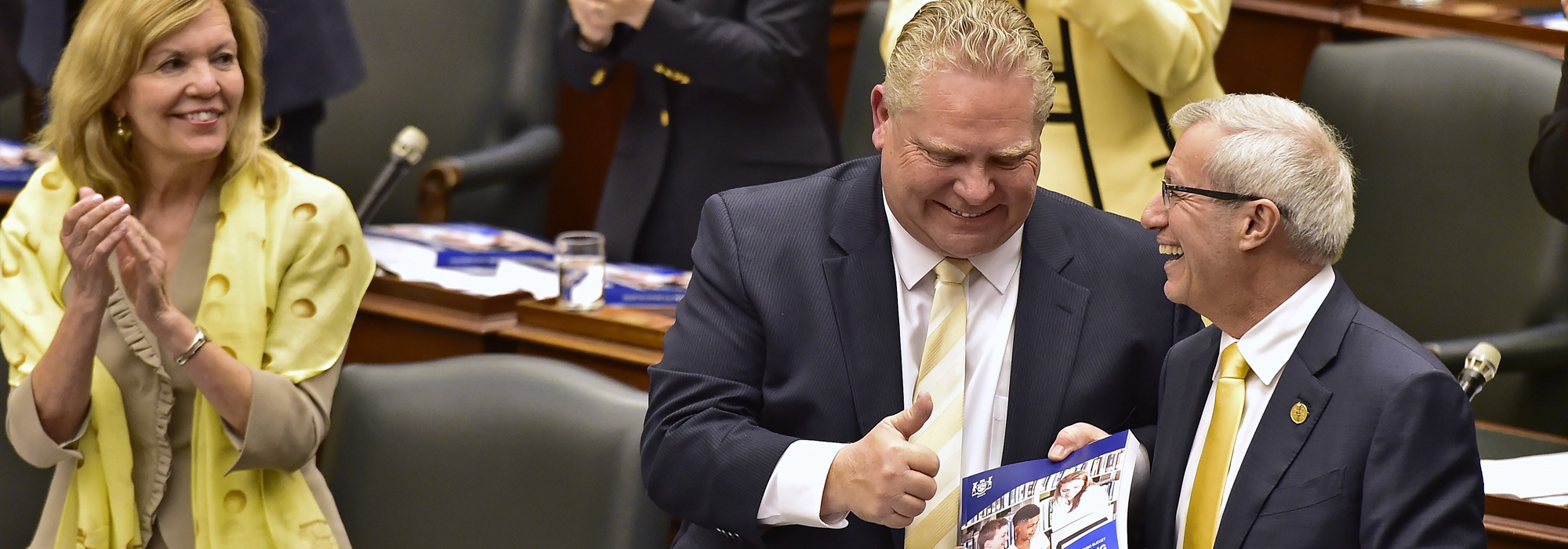
Doug Ford’s arrival as Ontario’s premier a year ago was widely seen as a harbinger of a populist realignment in Ontario and Canadian politics. However, the dramatic fall in the Ford government’s polling numbers in the weeks after its April 11 budget raises the question of whether voters had truly embraced Ford’s cost-cutting brand of populism, or was his election victory a temporary aberration in response to an unpopular government. Has Ford’s aggressive cost-cutting and restructuring agenda overstepped the boundaries of what Ontarians thought they had voted for in June 2018?
The Ford government was elected on a remarkably thin platform; principally, promising cuts in taxes and hydro rates. These were to be paid for by finding “efficiencies” in government operations, as opposed to actually laying off teachers, nurses, and other front-line staff and cutting services.
A year in, the Ford government has demonstrated a remarkable talent for disruption and destruction. But it has very little to show in terms of constructive progress. The government talks about “protecting the things that matter most” but its cuts-across-the-board behaviour suggest that it doesn’t have any sense of what those things might actually be.
The budget cuts and restructuring initiatives launched by the Ford government have been so broad and so deep it is difficult to identify any specific targets or strategies. Public health; legal aid; renewable energy; energy efficiency; climate change mitigation and adaptation; social assistance; children’s aid; secondary and post-secondary education; health care; flood protection; tourism promotion; and gasoline tax transfers for municipalities have all been hit.
The offices of the Advocate for Children and Youth, and of the Environmental Commissioner of Ontario have been eliminated as independent entities. Think tanks like the Mowat Centre and the Institute for Competitiveness and Prosperity, which were intended to look to the province’s future, had their core funding terminated.
Although “open for business” is one of the government’s favourite slogans, the most recent cuts flowing from the government’s first budget have hit sectors seen as essential to the province’s economic future, particularly information technology. There have been major reductions in provincial contributions to the Vector Institute for Artificial Intelligence and Canadian Institute for Advanced Research, along with cuts to the innovation-focused Ontario Centres of Excellence, and training, mentoring and start-up support for small businesses.
The sum of the Ford government’s first year had been described as a “war on the future,” as well as a war on the province’s most vulnerable residents.
The government justified its actions on the basis of an unexpectedly large budget deficit left by the Liberals. The extent to which it has overstated the size of the deficit is a matter of ongoing debate, particularly as Ontario has among the lowest rates of per capita revenues and expenditure among the provinces.
What is clearer is that the Ford government has itself shredded major revenue sources; most notably, hundreds of millions of dollars per year from the cancelled greenhouse gas emission cap and trade system, as well as curtailing planned tax increases for high income earners. Although it is moving to clarify the true costs of the Liberal’s enormously expensive Fair Hydro Plan, with its artificial 25 per cent reduction of hydro rates and modifying the financial arrangements at the margin, the core of the plan, and its costs to taxpayers, has been left intact. At the same time, the government seems prepared to risk hundreds of millions of dollars in contract penalties and lawsuits to get beer and wine into corner stores.
The political costs of the government’s course have begun to grow dramatically since the tabling of its April budget. Recent polling suggests that premier Ford is hitting personal approval ratings well below those seen for Liberal ex-premier Kathleen Wynne in the run-up to the 2018 election. The leaderless Liberals, without party status in the Legislature, as well as the NDP, are now out-polling Ford’s Progressive Conservatives.
In the longer term, larger challenges loom. A poll suggests the Ontario Liberal party, if led by Toronto Mayor John Tory, would defeat Ford’s PCs by a wide margin. Tory, noted for his style of moderation and competence, may yet come to the conclusion that the only option to save his city (and the province) is to challenge Ford directly in 2022. Given that Tory is a past leader of the Ontario PCs, the question of what party he would lead remains unresolved.
The NDP, for its part, seems as stalled as it was before the June 2018 vote. The party needs to reflect on its inability to convince Ontarians that it was a viable alternative, not only to Kathleen Wynne’s tired Liberals, but to the virtually platformless, shambolic Ford campaign. The Greens, on the other hand, are benefiting from the nationwide Green surge and a strong performance by its one MPP, party leader Mike Schreiner. All of this may be setting the stage for a major re-alignment in Ontario politics in 2022.
The Ford government has been notable for the degree to which it has avoided obvious internal dissent, beyond the departures of MPPs Amanda Simard and Randy Hillier from the PC caucus. That may change if the PC’s polling numbers continue to fall. Senior ministers may also start thinking about the rest of their political careers and how much they will be forced to “wear” their roles in defending and implementing Ford’s increasingly indefensible decisions.
Attorney General Caroline Mulroney’s long-term political prospects may already have been blighted by her acquiescence to the invocation of section 33 of the Charter of Rights and Freedoms (the “notwithstanding” clause) in Ford’s crusade to reduce the size of Toronto city council. Education Minister Lisa Thompson, Social Services Minister Lisa MacLeod and Health Minister Christine Elliott all sit on the same kinds of precipices over the consequences of the government’s budget cutting, as does Environment, Conservation and Parks Minister Rod Phillips over its handling of the climate change issue.
Recent pull-back on retroactive budget cuts to municipalities for public health and other services – one of the least defensible aspects of the government’s agenda – perhaps comes as no surprise in this context. The larger question is whether it constitutes a tactical retreat, or a more serious change in direction by the populist premier.
The course of the next year will be telling in terms of whether the Ford government represents an aberration in Ontario politics, or a true realignment. Recent events suggest that Ontarians are seeing the downsides of their experiment with populist leadership, and may seek more moderate, stable and competent options in the future, regardless of what party label they wear.
Photo: Ontario Finance Minister Vic Fedeli is applauded by Premier Doug Ford and other MPPs after presenting the 2019 budget at the legislature in Toronto on April 11, 2019. THE CANADIAN PRESS/Frank Gunn
Do you have something to say about the article you just read? Be part of the Policy Options discussion, and send in your own submission. Here is a link on how to do it. | Souhaitez-vous réagir à cet article ? Joignez-vous aux débats d’Options politiques et soumettez-nous votre texte en suivant ces directives.








